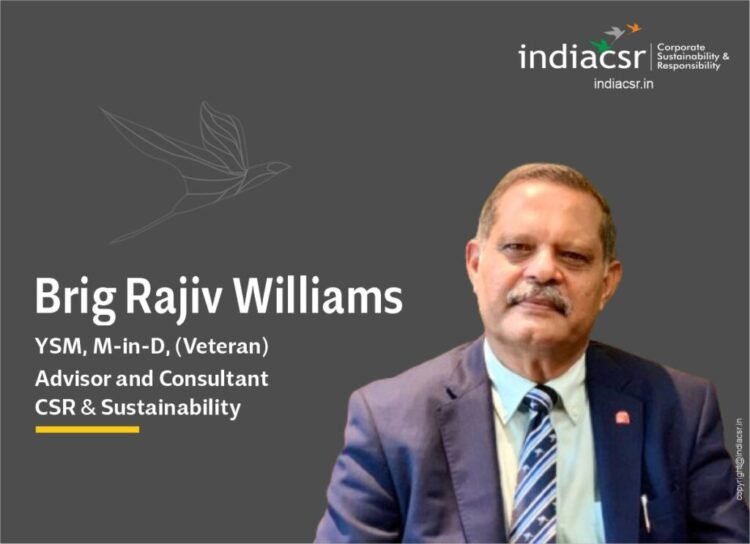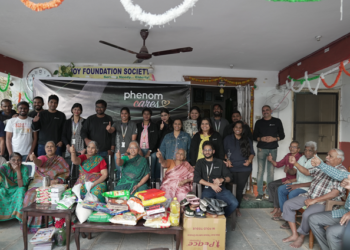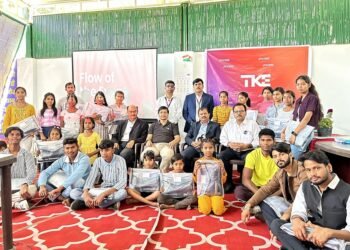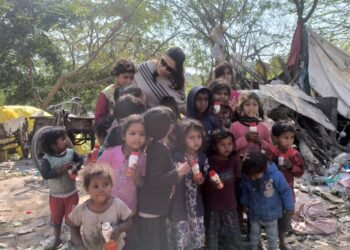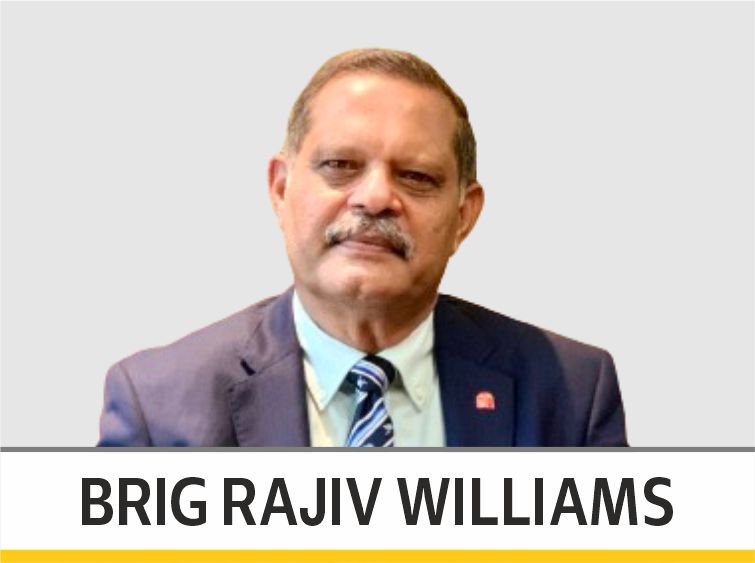
By Brig Rajiv Williams
The Indian Army continues to carry out tasks beyond what just meets the eye of protecting the sovereignty of the country. Such like tasks could well come under the purview of “Beyond Military business activities”. These Beyond Military business activities”, are activities, which come under “Aid to civil authorities” which include besides maintaining law and order, activities in support of the civil administration in times of natural calamities and other areas of engagement with the aim of facilitating them in bringing a situation under control.
All such ‘Beyond Military activities’ are formal official duties, which the military is required to fulfil as per the designated mandate, like saving lives from fire accidents or floods and rescue missions and so on. All such tasks are the civil face of the military, but there are other tasks carried out by the Army, which do not strictly come under such purview and can be classified under “Army Social Responsibility” (ASR).
Army Social Responsibility (ASR) and Corporate Social Responsibility (CSR) have a strong symbiotic relationship in our understanding of the development sector, where-in disciplined social support lends toward corporates getting engaged in community development, because both the Institutions have “People” at the ‘Centre’ of all engagement. For it is ‘People’ who are most important when we talk of development and growth and is the very philosophy on which we should rely upon for security and business.
Personal reflections
When I sought premature retirement from the Indian Army, after a very illustrious and rewarding career, I realized that it is the ‘Man’ behind the ‘Machine’, who has to be encouraged and motivated to ensure that he and his team put in their best toward goal accomplishment. After doffing my uniform, I started to deep dive into the relatively new concept being adopted in Corporations and that was Corporate Social Responsibility – CSR, based on the precepts of the triple bottom line – ‘People, Planet and Profit’.
Again, the first ‘P’ was the critical mover and shaker for all that Corporations have to focus to ensure they become sustainable entities. For it is the People who drive profits for the companies to survive and they can only survive if Corporations look after the people, be it their employees, their local communities or be it along their supply chains. This factor of the first ‘P’ essentially focused on the principle of ‘Respect’. People focus remains centric to the Army deployed in different geographies with projects launched under different code names like ‘Op Good Samaritan’ or ‘Op Sadbhavana.
As a young officer during the 1971 India – Pakistan war, commissioned into the Infantry, I moved straight into the battle theater, soon after graduating from the precincts of the Indian Military Academy, Dehradun. Our training had to be cut short by five weeks and the excited young officers were sent straight into combat. It was a time of much transformation as we were now leading men into battle.
Battle – yes with an enemy, whom we could identify and ‘Shoot to kill’, our very basic tenet of our training at the military institution. But what about the enemy, whom we could not identify i.e the civilians left behind by the withdrawing Pakistani soldiers deployed around their areas for their protection?
They were just citizens – they were just people who by virtue of their abode lived there for many years and did not have a direct play in any of the military-related activities. ‘People’, who were supposed to have been protected by the Pakistan military, a very important responsibility of the Pakistan Army.
However, when the Pakistan Army failed to protect the locals in the area as they retreated it became a matter of great concern even for the Indian Army troops as the Pakistani citizens had to be somewhat “Cared for and protected’ – a need far beyond Army Responsibility in a conflict Zone.
I now write from the standpoint of the people who came in contact with my troops as we advanced into Pakistan in Shakargarh area in what was then known as West Pakistan, that I realized ‘People’, remain central to all endeavor of ‘Pride and Prejudice” or in the space of ‘Conflict Management’.
Before taking premature retirement from the Indian Army after over 33 years, I had a rather fulfilling tenure at Drass, the coldest inhabited place in the world, in the Ladakh Region of the State of Jammu and Kashmir. For it was soon after the Kargil war, that the Army as part of civil support, initiated Operation (Op) Sadbhavana, an operation to provide succor to the local population.
In effect Op Sadbhavana came under Border Management and could well be considered an important adjunct of ‘Army Social responsibility’ – ASR, toward the people in the proximity of the Military cantonments and Army posts.
The concept itself was part of the larger agenda of “Conflict prevention” rather than being embroiled in the process of “Conflict Resolution” under the overall architecture of “Conflict Management”. I reflect upon the chasm, which existed between the military and the civil just prior to the transformation which took place with this social responsibility operation codenamed “Op Sadbhavana”.
It was this suspect between the two entities and lack of respect toward each other, which contributed toward the the “Kargil war” of 1999. For it is important for the military to have a good and harmonious relationship with the civilians in the vicinity to ensure that information flow remains a key in the overall strategy of Conflict management.
It was this realization and learning that encouraged me to join the development sector and get engaged in Corporate Social Responsibility (CSR), around the time when CSR was becoming a buzz word in the country. The Army realized its social responsibility and how it helped in reducing terrorism in the area.
On joining the corporate world as a development practitioner, I found a lot of similarity on engaging with the local communities by not following the earlier precepts of “Charity Welfare Philanthropy” (CWP), but adapting to the new model, which demands more inclusivity and value creation in geographies around the factories and supply chains. The aim being empowering communities and, in the process, obtain the support of the locale, who in return provide the much required ‘License to operate”.
Military Individual Social Responsibility (MISR)
In addition to the ASR perspective mentioned above, the “Directorate of Military Affairs”, in June 2023 has issued instructions to the three Defence Services relating to compulsory – er mandatory ‘Social Service’ to be carried out by all personnel proceeding on leave of absence. This in a way is to encourage and inculcate in troops the concept of “Individual Social Responsibility” (ISR).
The social activities, which the soldiers can carry out have been listed in the official instructions. Hence it is a form of Military Individual Social Responsibility (MISR), which is part of a mandate issued and hence will be somewhat different to “Individual Social Responsibility”, which is more of volunteering and has a direct connect with the aspect of “Joy of doing” community good. This has a direct linkage with the ‘Head and Heart’ as it is not strictly on a project mode, which is a “Foundational principle” of all Corporate Social Responsibility initiatives.
In addition, all the work done by soldiers needs to be documented and reports submitted to the units and formations up the chain on what activities have been carried out. That sure is a big ‘Ask’ from soldiers, who need to enjoy their stay with their families after prolonged separation from their families, due to their postings in difficult areas with limited opportunities to keep their families in the stations of their postings even in peace time locations.
Challenges around Mandatory Military Individual Social Responsibility
Forcibly making soldiers on leave carry out social work may lead to resentment and frustration. My rationale for such an observation is that all such community facilitation / work with society has to be carried out from the heart. It has to be carried out with the intent of joyfully supporting a cause and that comes from within. Such a forced activity by soldiers on leave has to be reported to authorities with proper photographic evidence to support their claim, which in turn will give them some brownie points toward their official annual reports.
This kind of rat race, will result in unnecessary challenges and result in peer pressure. Besides, it has also been reported that the efforts during the phase of such Military Individual Social Responsibility will promote Government-sponsored schemes, which in a way alludes to endorsing all Government activities, which may not be correct as an independent arm of the Government machinery.
Implications of Corporate CSR funding Army Social Responsibility projects
With the initial initiation of ASR through the discussed operations – “Sadbhavana and Samaritan”, the scope of Corporations investing into such projects as part of their CSR resulted in a dialogue process between the Army and Corporates. Several corporations with a sense of déjà vu and pride started to park their mandatory CSR investments into military projects.
While there may be some good in getting that kind of funding support from Corporations, yet as per Morgenthau’s concept of ‘Power and politics’ and in the instant case, could relate to the concept of receiving ‘Aid’, with obvious strings attached to a larger political agenda. Political Realism has a distinctive approach and subject – matter.
It stands for political standards for political actions and subordinates all other standards to political standards. Morgenthau emphasized the importance of “the national interest,” and in Politics Among Nations, he wrote that “the main signpost that helps political realism to find its way through the landscape of international politics is the concept of interest defined in terms of power.”
Hence it is important for the Army to very succinctly analyze such support being rendered and consider seriously around such kind of CSR funding from Corporates. Should the Army encourage this kind of investment into the revenue model of social responsibility, which will include doling out funds / equipment to individuals be it war widows or other battle casualties?
Should the Army examine to include Corporations in funding toward infrastructure support for the two entities and others for whom the Army takes on the responsibility as per the norms of doing social good. These questions become real before the Army just opens such opportunities for Corporate CSR investments. It will be relevant to state that Corporate CSR support over the past decade, especially after the mandatory law on CSR came into force since 2014, is being given toward Army projects.
Thoughts around Corporate CSR funds for Army projects
It is in the above context, I suggest that the Army carry out deep introspection on receiving such support from Corporations toward the social causes addressed by the Army. The bottom line of the assistance must not impact the independence of such goodwill and spread of social responsibility.
I would encourage that the Army Social responsibility should reach out to the remotest parts of the country, where the military is deployed and volunteers from corporations be encouraged to serve communities where the projects need to scale up.
Financial assistance for war widows, who are reasonable well supported through Government schemes, should be avoided. However, employment opportunities for the widows and the differently abled must be encouraged.
In fact support to the disabled soldiers due to injuries other than war should be an area of encouraging corporations to support them in skill development and providing employment opportunities to this category of personnel, as they do not receive any financial support from within the organisation itself when boarded out of service.
Funding Army goodwill projects from Corporate CSR, maybe encouraged in long-term infrastructure development and on skill training around Corporate manufacturing facilities/factories / Corporate Institutions or other such like projects. Environmental protection, WASH, Health and Hygiene projects and the like could well be developed through collaboration with the industry.
Conclusion
The concept per se for the Army to carry out its responsibility beyond just protecting the territorial integrity of the country, which is prime and uncompromisable, has to be carried out with deeper understanding and certainly beyond just a mandate issued by a Government diktat. While the argument can continue on getting funds from Corporate CSR for furthering the social cause related activity, yet the usage of such CSR funding support should be analysed holistically and not be linked to any overt reactions and favours expected from such aid being given.
Corporate CSR funding is also linked to the intent, which will obviously be good but will also be akin to vendor accreditation, with adequate transparency and should be a good fit in the overall military social responsibility aim. That aim must never be compromised by the Military and this especially relates to that person taking the decision to accept or to reject. My rational for this observation is that the decision makers at that level are the higher echelon of command, who are also on the verge of looking out for opportunities.
With regard to the policy issued by the Government on Military Individual Social Responsibility and which has trickled down to formations and units for implementation, needs to be very cautiously looked at from the perspective of troop morale. That extra expectation to be carried out by a soldier as a joyful giving back to society should be the key theme of the instructions issued and not something thrust upon him during his well-deserved leave. It is in such understanding of social good that the military can remain committed to the overall growth and development of his individual skills and at the same time facilitate a cause of the local community on a purely voluntary basis.
About the Author
Brig Rajiv Williams, after a distinguished 33-year military career with notable service in challenging areas like Drass, Kargil, and Siachen Glacier, transitioned to a corporate role at Jindal Stainless Limited as the Group Head of CSR and Sustainability. Over 17 years, he led initiatives in education, skill development, healthcare, women empowerment, sustainable agriculture, and clean water projects.
As an expert in CSR and sustainability, he now advises various organizations, including Subcinctus in Australia and MPowered Inc in the USA. Williams has contributed significantly to discussions on business and human rights, receiving both military and civilian accolades, including the Yudh Seva Medal and Asia Pacific Leadership Award. He is a respected author and speaker on CSR, responsible business, and military topics, with his work featured in international publications.
Views are personal.
(Copyright@India CSR)

